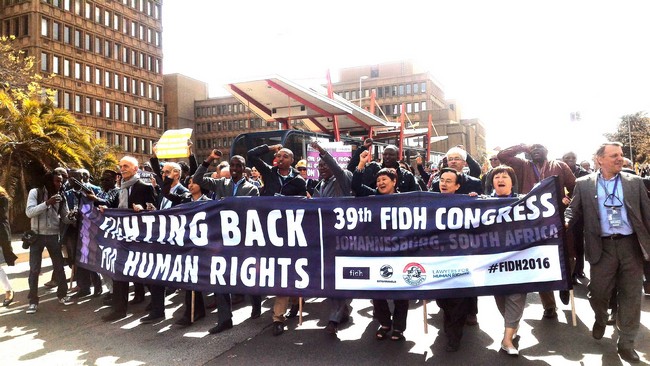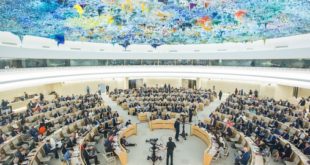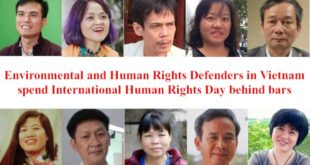JOHANNESBURG, 27 August 2016 (VCHR) – At the 39th Congress of the International Federation of Human Rights (FIDH) in Johannesburg, South Africa from 23 – 27 August 2016, 400 human rights defenders representing 178 member leagues of the FIDH from 117 countries around the world adopted a “Resolution on the Human Rights Situation in Vietnam” denouncing an escalation of repression in the country since the XIIth Congress of the Vietnamese Communist Party in January 2016.
“The Resolution describes systematic and systematized oppression in Vietnam. Alongside the widespread arrests and harsh prison sentences of dissidents and human rights defenders, brutal repression of peaceful demonstrations and daily harassments of members of non-recognized religious communities, the Vietnamese authorities continue to adopt anti-human rights legislation which condones arbitrary practices and virtually legalizes the abuse of internationally-recognized human rights”, said Võ Trần Nhật, Executive Secretary of the Vietnam Committee on Human Rights (VCHR), who represented the VCHR in Johannesburg.

The Resolution on Vietnam, which was proposed by VCHR, an affiliate of the FIDH, was adopted unanimously by FIDH members, who expressed particular concern about the recent ecological catastrophe caused by the Taiwanese steel conglomerate “Formosa” in central Vietnam (April 2016). The unprecedented pollution of coastal waters, which caused massive fish deaths and decimated the fishing industry in four provinces of Central Vietnam, sparked off widespread demonstrations which were brutally quelled by Police. “The Formosa affair summarizes all aspects of the human rights situation in Vietnam; by suppressing these legitimate protests, the authorities are clearly seeking to stifle the emergence of a human rights conscience in Vietnam” said Võ Trần Nhật.
The Resolution also described the arbitrary detention of human rights defenders such as Thích Quảng Độ, Buddhist monk and leader of the non-recognized Unified Buddhist Church of Vietnam (UBCV), and human rights lawyer Nguyễn Văn Đài, arrested in December 2015, whose pre-trial detention has just been extended for a further four months. Vietnam was also singled out by the FIDH in another resolution on repression against human rights defenders around the world.
The FIDH holds its 39th Congress in South Africa on the theme of “Fighting back for Human Rights”, to develop global civil society strategies to resist and retaliate against the growing restrictions on human rights imposed by governments all over the world. Speakers at the Congress included Stavros Lambrinidis (EU Special Representative on Human Rights), Faith Pansy Tlakula (Chairperson of the African Commission on Human and Peoples’ Rights, South Africa), John Jeffery (Deputy Minister of Justice and Constitutional Development, South Africa), Justice Dikgang Moseneke (former Deputy Chief Justice, South Africa) and Reverend Canon Mpho Tutu van Furth who came to deliver a message from her father, Archbishop Desmond Tutu, who is currently in hospital.
The FIDH was founded in 1922 and has 178 affiliated leagues in 117 countries in five continents. It is the oldest and largest France-based human rights organization. FIDH’s has a long history of supporting human rights defenders in Vietnam. In the 1920s, it successfully abrogated the prison sentences of two renowned Vietnamese patriots, Phan Boi Chau and Phan Chu Trinh. –
Full text of the Resolution:
Presented by Vietnam Committee on Human Rights (VCHR)
The International Federation of Human Rights at its 39th Congress:
Whereas following the 12th Congress of the Communist Party of Vietnam (January 2016), the Vietnamese government, predominantly composed of members of the army and the security forces, intensified repression against all forms of freedom of expression;
Whereas in March 2016, in the space of two weeks alone, at least 7 human rights activists were arbitrarily sentenced to a total of 22 years in prison simply for exercising their right to freedom of expression and peaceful demonstration;
Whereas as a general rule, repression by the Vietnamese government targets all those who speak out for human rights: human rights defenders, members of “non-recognised” religions, dissidents, bloggers, and simple citizens who protest are put under surveillance, submitted to questioning, harassed and physically assaulted by the police, arrested, even detained in psychiatric institutions;
Whereas during April-May 2016 Vietnam was hit by an unprecedented industrial pollution incident from the release of 300 tons of toxic waste most likely from a giant steel conglomerate causing damage to over 200 kilometers of Central Vietnam’s coast and extending as far as the neighbouring country Philippines, causing millions of dead fish to be washed ashore and ruining fishing industry in the region;
Whereas in April-May 2016 Vietnam was hit by an unprecedented environmental catastrophe caused by 300 tons of toxic waste probably released by a giant steel conglomerate which has polluted over 200 kilometers of Central Vietnam’s coastal waters and extended in neighbouring countries such as the Philippines, causing millions of dead fish to be washed ashore and ruining fishing prospects in the region;
Whereas this ecological disaster led to widespread indignation amongst the Vietnamese population; a vast mobilisation of social networks took place and massive peaceful demonstrations were staged in all the large cities of Vietnam; Vietnamese authorities reacted by temporarily blocking access to social networks, while violently repressing demonstrations, including using police-controlled thugs and arresting protesters;
Whereas Vietnam continues to use vaguely-worded and catch-all provisions in the Criminal Code related to “national security” such as “spying”, “anti-State propaganda”, and activities “aiming to overthrow the government” or others like “abuse of democratic freedoms” to silence political dissidents, human rights defenders and plain demonstrators;
Whereas despite persistent appeals from the international community, Vietnam maintained the death penalty for “national security” crimes during its recent amending of its revised Criminal Code (adopted in November 2015);
Whereas in April 2016 Vietnam adopted a law on Access to Information and an amended Press Law restricting freedom of expression and reinforcing censorship, and drew up an edict banning demonstrations outside tribunals; and is expected to pass a Law on Associations and a Law on Belief and Religion which are incompatible with international norms of freedom of association and freedom of religion;
Whereas some dissidents are kept under house arrest, when not in prison, sometimes for decades, as in the case of Thích Quảng Độ, Head of the Unified Buddhist Church of Vietnam, (an independent historical church arbitrarily banned since 1981) who has been detained for over 30 years;
Whereas in the run up to the legislative elections of 22 May, many independent candidates have been prevented from running;
Whereas the EU Mediator pronounced the European Commission guilty of maladministration for refusing to conduct a Human Rights Impact Assessment prior to the negotiations of the EU-Vietnam Free Trade Agreement;
Regrets that Vietnam did not abolish the death penalty during its amendment of the Criminal Code, particularly for crimes against “national security” and that it continues to condemn to death an average of 100 persons each year;
Denounces the adoption of a legal arsenal that seeks to restrict the fundamental rights of the Vietnamese people and grants the authorities extraordinary and arbitrary power to repress human rights defenders or anyone simply wishing to enjoy those rights;
Denounces Vietnam’s policy of censorship and withholding information that brings about, through brutal crackdowns (police brutality and harassment, unfair trials, repressive laws) a climate of fear amongst those who seek to speak freely or participate in public affairs;
Calls on Vietnam for the immediate unconditional release of all persons detained simply for the peaceful legitimate exercise of their fundamental rights, starting with Buddhist dissident Thích Quảng Độ and human rights lawyer Nguyễn Văn Đài.
Urges Vietnam to establish a genuine and sincere collaboration with the United Nations on the issue of human rights by inviting the Special Procedures, such as the Special Rapporteur on Freedom of Expression and the Special Rapporteur on Human Rights Defenders to visit Vietnam, and giving them unfettered freedom to carry out their investigation;
Condemns in this regard, the interference into the visit of the UN Special Rapporteur on Freedom of Religion or Belief, Heiner Bielefeldt, during his visit to Vietnam in July 2014;
Urges the European Union and the United States of America, which have, or are about to sign free trade agreements with Vietnam, to ensure that these agreements guarantee respect for the fundamental rights of the Vietnamese people, in particular by establishing mechanisms for effective and impartial recourse, and remain firm so that Vietnam will fulfill its commitments to human rights.
(Translated from the French by FIDH).
This post is also available in: French Vietnamese
 Quê Me Quê Me: Action for democracy in Vietnam & Vietnam Committee on Human Rights
Quê Me Quê Me: Action for democracy in Vietnam & Vietnam Committee on Human Rights




